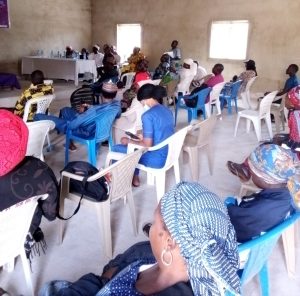In today’s digital age, social media platforms serve as critical tools for journalists, particularly in Nigeria, where the media plays a vital role in shaping public discourse and holding power accountable. However, as social media algorithms become more sophisticated, journalists are now confronted with the challenge of decoding a new form of language - 'algospeak.' This term refers to the deliberate use of code words, euphemisms, and creative language to circumvent censorship, content moderation, and algorithmic flagging on platforms like Twitter, Facebook, and TikTok.
Nigerian journalists, especially those involved in investigative reporting and social justice causes, must grasp the dynamics of algospeak to ensure they accurately interpret online conversations and trends. By doing so, they will be better equipped to identify the truth, navigate misinformation, and fulfill their critical role as gatekeepers of credible information.
What is Algospeak?
Algospeak emerges when social media users attempt to avoid content moderation algorithms designed to detect and restrict sensitive or controversial content. Instead of directly referencing terms that trigger these algorithms - such as "violence," "death," or "racism" - users substitute these terms with creative alternatives. For instance, instead of saying "suicide," users may say "unalive." This coded language allows conversations to continue without triggering the automatic censorship systems employed by social media platforms.
According to internet culture analyst Ryan Broderick, “algospeak is the internet’s linguistic workaround,” as it allows people to discuss controversial or sensitive topics without facing restrictions. Nigerian journalists must become familiar with these language shifts, as failing to understand algospeak could mean missing out on important discussions, particularly those surrounding human rights abuses, political activism, and protests.
 The Role of Journalists in Decoding Algospeak
The Role of Journalists in Decoding Algospeak
In a country like Nigeria, where media freedom is often tested and social media is a hotbed for activism, journalists must learn to read between the lines of digital discourse. With movements like #EndSARS, social media played a pivotal role in raising awareness and mobilizing protests against police brutality. However, as platforms tightened their content policies in response to misinformation and hate speech concerns, Nigerian activists and influencers began adopting algospeak to avoid being censored.
For instance, words like "protest" may be replaced with terms such as "gathering" or "meeting" to evade flagging by algorithms. As Nigerian journalists cover these movements, their ability to decode these euphemisms becomes essential in ensuring accurate reporting and the amplification of marginalized voices.
As former journalist and media consultant Andrea Faye Hart noted, “The press plays an indispensable role in interpreting the coded language that can often obscure the very truths we are trying to uncover.”
Techniques for Decoding Algospeak
Stay Updated with Online Trends: Journalists should follow online communities where algospeak is commonly used. These may include activist groups, influencer circles, or even niche Twitter and Reddit communities. These spaces often create and spread new slang and coded language. By staying plugged into these conversations, Nigerian journalists can understand new words or symbols as they emerge.
Use Social Media Monitoring Tools: There are several tools available that can help journalists track online trends and changes in language. Tools such as CrowdTangle or TweetDeck can allow journalists to monitor conversations that contain euphemisms or unfamiliar language. By observing patterns in posts and comments, journalists can identify potential instances of algospeak.
Collaborate with Digital Literacy Experts: In Nigeria, digital literacy experts are valuable resources for journalists trying to keep up with the fast-paced evolution of online language. These experts can provide insights into the shifting dynamics of online discourse and how algorithms shape what is visible and what is hidden. In the words of scholar Ethan Zuckerman, “Understanding how algorithms influence the flow of information is essential for journalists to make sense of the media ecosystem in which they operate.”
 Engage with Content Creators and Activists:
Engage with Content Creators and Activists: Many Nigerian activists, influencers, and content creators use algospeak as a survival strategy to ensure their content remains visible. Building relationships with these individuals can offer Nigerian journalists first-hand insights into how this coded language is crafted and spread. It can also open up a network of credible sources who are adept at navigating the complexities of online expression.
Adapt Reporting to the New Digital Landscape: It is important for Nigerian journalists to adapt their reporting practices to account for algospeak. Just as they fact-check stories and verify sources, journalists must now take the time to decode the language being used online. This can include providing context in stories that explain the usage of algospeak to readers unfamiliar with the concept.
Ethical Considerations in Decoding Algospeak
While decoding algospeak is crucial, Nigerian journalists must also be cautious about the ethical implications of doing so. Some users may adopt algospeak not just to avoid censorship but to protect themselves from surveillance or persecution. In these cases, revealing the true meaning behind the language could endanger activists or whistleblowers. Journalists must strike a balance between uncovering hidden truths and respecting the safety and privacy of online communities.
Conclusion
Algospeak represents a growing challenge in the digital age, especially for Nigerian journalists tasked with navigating a complex social media landscape. As algorithms continue to shape how information is disseminated and censored, the ability to decode this evolving language becomes a vital skill. By staying updated on trends, using monitoring tools, engaging with content creators, and adhering to ethical standards, Nigerian journalists can rise to the occasion and continue to serve as critical voices in the quest for truth and accountability.
In the words of Nigerian journalist and media advocate, Chidi Odinkalu:
“The future of journalism in Nigeria depends not only on what we report but also on our ability to understand and adapt to the language of the digital public square.”
By decoding algospeak, Nigerian journalists can continue to play their pivotal role as watchdogs in an increasingly digital world, ensuring that critical conversations remain visible, accessible, and impactful.
 The Role of Journalists in Decoding Algospeak
In a country like Nigeria, where media freedom is often tested and social media is a hotbed for activism, journalists must learn to read between the lines of digital discourse. With movements like #EndSARS, social media played a pivotal role in raising awareness and mobilizing protests against police brutality. However, as platforms tightened their content policies in response to misinformation and hate speech concerns, Nigerian activists and influencers began adopting algospeak to avoid being censored.
For instance, words like "protest" may be replaced with terms such as "gathering" or "meeting" to evade flagging by algorithms. As Nigerian journalists cover these movements, their ability to decode these euphemisms becomes essential in ensuring accurate reporting and the amplification of marginalized voices.
As former journalist and media consultant Andrea Faye Hart noted, “The press plays an indispensable role in interpreting the coded language that can often obscure the very truths we are trying to uncover.”
Techniques for Decoding Algospeak
Stay Updated with Online Trends: Journalists should follow online communities where algospeak is commonly used. These may include activist groups, influencer circles, or even niche Twitter and Reddit communities. These spaces often create and spread new slang and coded language. By staying plugged into these conversations, Nigerian journalists can understand new words or symbols as they emerge.
Use Social Media Monitoring Tools: There are several tools available that can help journalists track online trends and changes in language. Tools such as CrowdTangle or TweetDeck can allow journalists to monitor conversations that contain euphemisms or unfamiliar language. By observing patterns in posts and comments, journalists can identify potential instances of algospeak.
Collaborate with Digital Literacy Experts: In Nigeria, digital literacy experts are valuable resources for journalists trying to keep up with the fast-paced evolution of online language. These experts can provide insights into the shifting dynamics of online discourse and how algorithms shape what is visible and what is hidden. In the words of scholar Ethan Zuckerman, “Understanding how algorithms influence the flow of information is essential for journalists to make sense of the media ecosystem in which they operate.”
The Role of Journalists in Decoding Algospeak
In a country like Nigeria, where media freedom is often tested and social media is a hotbed for activism, journalists must learn to read between the lines of digital discourse. With movements like #EndSARS, social media played a pivotal role in raising awareness and mobilizing protests against police brutality. However, as platforms tightened their content policies in response to misinformation and hate speech concerns, Nigerian activists and influencers began adopting algospeak to avoid being censored.
For instance, words like "protest" may be replaced with terms such as "gathering" or "meeting" to evade flagging by algorithms. As Nigerian journalists cover these movements, their ability to decode these euphemisms becomes essential in ensuring accurate reporting and the amplification of marginalized voices.
As former journalist and media consultant Andrea Faye Hart noted, “The press plays an indispensable role in interpreting the coded language that can often obscure the very truths we are trying to uncover.”
Techniques for Decoding Algospeak
Stay Updated with Online Trends: Journalists should follow online communities where algospeak is commonly used. These may include activist groups, influencer circles, or even niche Twitter and Reddit communities. These spaces often create and spread new slang and coded language. By staying plugged into these conversations, Nigerian journalists can understand new words or symbols as they emerge.
Use Social Media Monitoring Tools: There are several tools available that can help journalists track online trends and changes in language. Tools such as CrowdTangle or TweetDeck can allow journalists to monitor conversations that contain euphemisms or unfamiliar language. By observing patterns in posts and comments, journalists can identify potential instances of algospeak.
Collaborate with Digital Literacy Experts: In Nigeria, digital literacy experts are valuable resources for journalists trying to keep up with the fast-paced evolution of online language. These experts can provide insights into the shifting dynamics of online discourse and how algorithms shape what is visible and what is hidden. In the words of scholar Ethan Zuckerman, “Understanding how algorithms influence the flow of information is essential for journalists to make sense of the media ecosystem in which they operate.”
 Engage with Content Creators and Activists: Many Nigerian activists, influencers, and content creators use algospeak as a survival strategy to ensure their content remains visible. Building relationships with these individuals can offer Nigerian journalists first-hand insights into how this coded language is crafted and spread. It can also open up a network of credible sources who are adept at navigating the complexities of online expression.
Adapt Reporting to the New Digital Landscape: It is important for Nigerian journalists to adapt their reporting practices to account for algospeak. Just as they fact-check stories and verify sources, journalists must now take the time to decode the language being used online. This can include providing context in stories that explain the usage of algospeak to readers unfamiliar with the concept.
Ethical Considerations in Decoding Algospeak
While decoding algospeak is crucial, Nigerian journalists must also be cautious about the ethical implications of doing so. Some users may adopt algospeak not just to avoid censorship but to protect themselves from surveillance or persecution. In these cases, revealing the true meaning behind the language could endanger activists or whistleblowers. Journalists must strike a balance between uncovering hidden truths and respecting the safety and privacy of online communities.
Conclusion
Algospeak represents a growing challenge in the digital age, especially for Nigerian journalists tasked with navigating a complex social media landscape. As algorithms continue to shape how information is disseminated and censored, the ability to decode this evolving language becomes a vital skill. By staying updated on trends, using monitoring tools, engaging with content creators, and adhering to ethical standards, Nigerian journalists can rise to the occasion and continue to serve as critical voices in the quest for truth and accountability.
In the words of Nigerian journalist and media advocate, Chidi Odinkalu: “The future of journalism in Nigeria depends not only on what we report but also on our ability to understand and adapt to the language of the digital public square.”
By decoding algospeak, Nigerian journalists can continue to play their pivotal role as watchdogs in an increasingly digital world, ensuring that critical conversations remain visible, accessible, and impactful.
Engage with Content Creators and Activists: Many Nigerian activists, influencers, and content creators use algospeak as a survival strategy to ensure their content remains visible. Building relationships with these individuals can offer Nigerian journalists first-hand insights into how this coded language is crafted and spread. It can also open up a network of credible sources who are adept at navigating the complexities of online expression.
Adapt Reporting to the New Digital Landscape: It is important for Nigerian journalists to adapt their reporting practices to account for algospeak. Just as they fact-check stories and verify sources, journalists must now take the time to decode the language being used online. This can include providing context in stories that explain the usage of algospeak to readers unfamiliar with the concept.
Ethical Considerations in Decoding Algospeak
While decoding algospeak is crucial, Nigerian journalists must also be cautious about the ethical implications of doing so. Some users may adopt algospeak not just to avoid censorship but to protect themselves from surveillance or persecution. In these cases, revealing the true meaning behind the language could endanger activists or whistleblowers. Journalists must strike a balance between uncovering hidden truths and respecting the safety and privacy of online communities.
Conclusion
Algospeak represents a growing challenge in the digital age, especially for Nigerian journalists tasked with navigating a complex social media landscape. As algorithms continue to shape how information is disseminated and censored, the ability to decode this evolving language becomes a vital skill. By staying updated on trends, using monitoring tools, engaging with content creators, and adhering to ethical standards, Nigerian journalists can rise to the occasion and continue to serve as critical voices in the quest for truth and accountability.
In the words of Nigerian journalist and media advocate, Chidi Odinkalu: “The future of journalism in Nigeria depends not only on what we report but also on our ability to understand and adapt to the language of the digital public square.”
By decoding algospeak, Nigerian journalists can continue to play their pivotal role as watchdogs in an increasingly digital world, ensuring that critical conversations remain visible, accessible, and impactful. 
